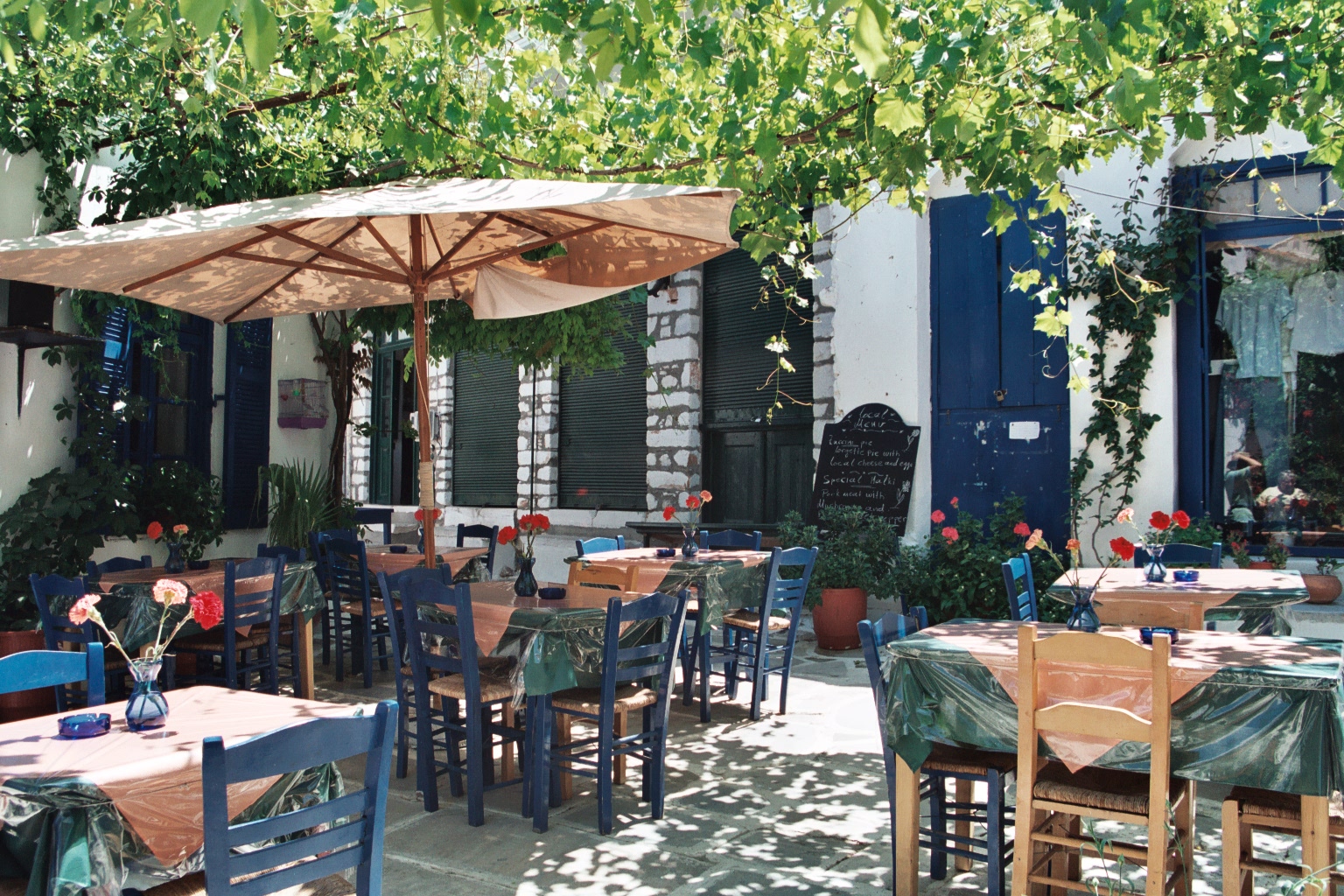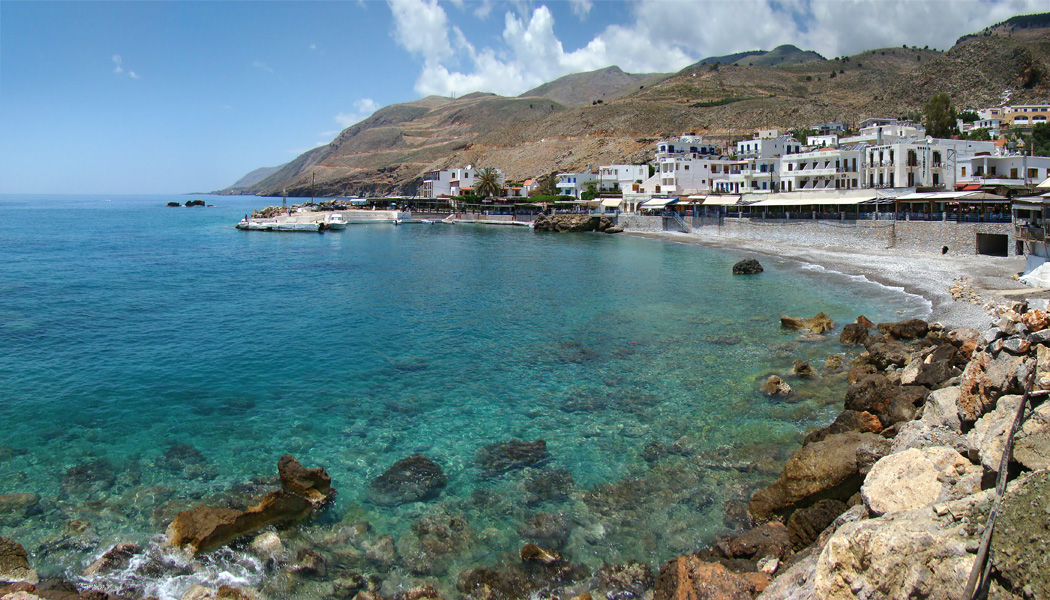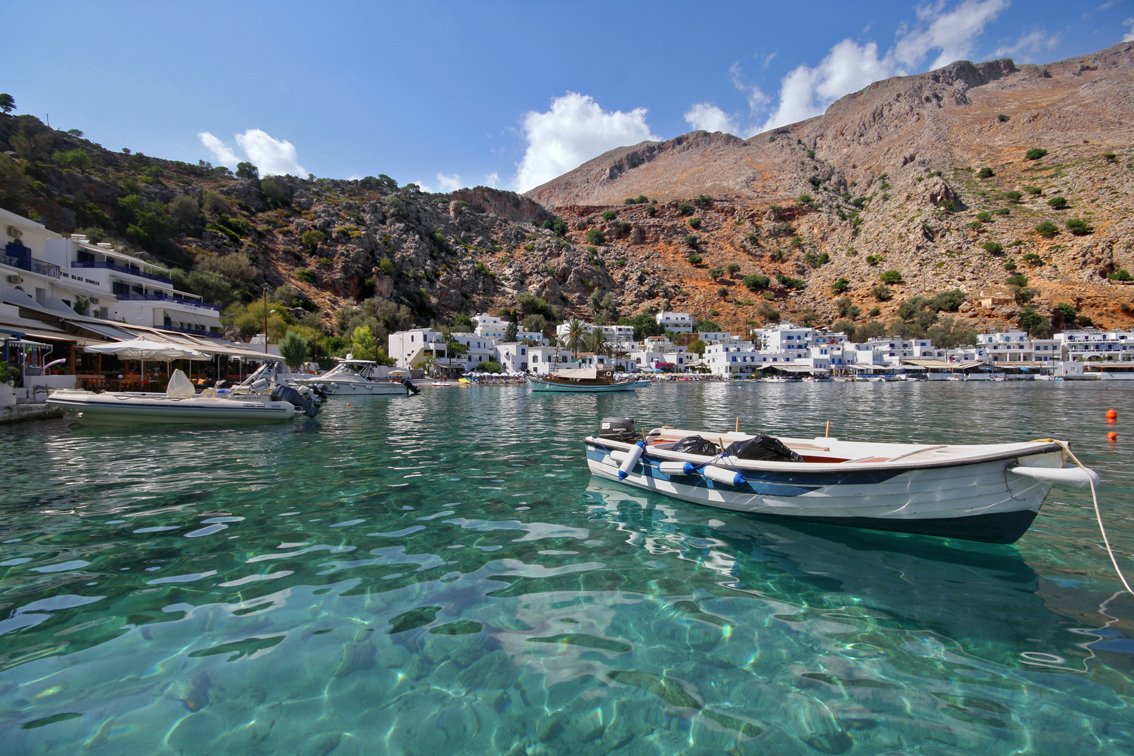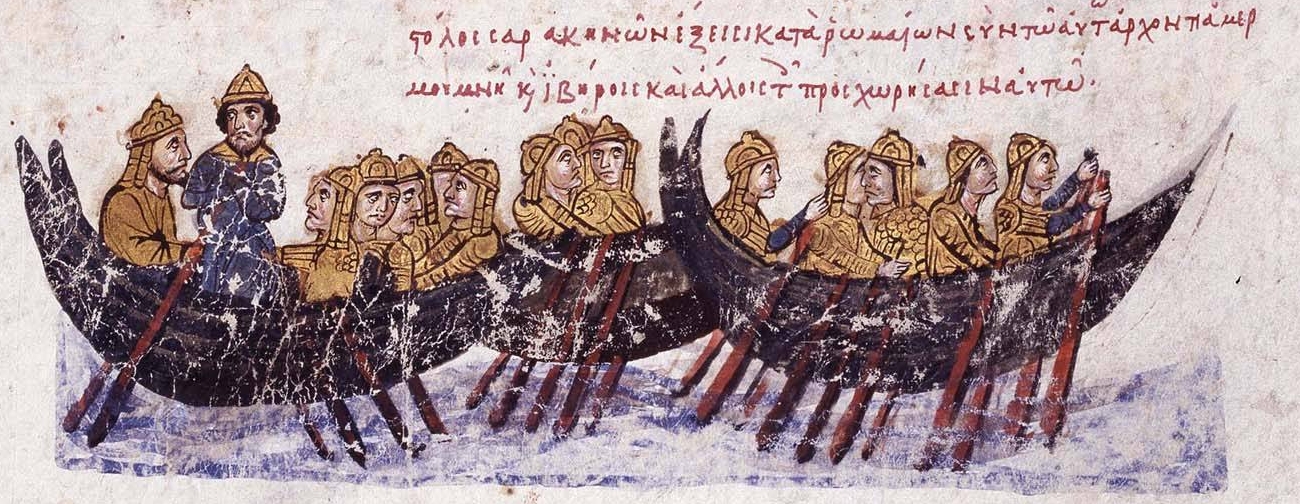|
Agia Roumeli
Agia Roumeli ( el, Αγιά Ρούμελη) is a small village in southwest Crete, Greece and is popular with tourists. Background Located a few kilometers above the town is the southern entrance to the Samaria Gorge. For most walkers, this is the exit, as the usual route through the gorge is to descend from the north. The gorge is a popular tourist destination in Crete, the longest gorge in Greece, and one of the longest in Europe, measuring 18 km. The village has several hotels and a few rooms for rent and also some tavernas. Agia Roumeli has a large beach and a ferry slipway where the ferry to and from Hora Sfakion via Loutro, arrives, mainly used by walkers who have completed the Samaria walk. The village is not accessible by road. According to one local source, the name comes from a corruption of the Arabic words ''Maya'' (وأتر) meaning water, and ''Roumi'' (رومى) meaning Byzantine Greeks, indicating a place of "Greek/Roman water", possibly a reference to the ... [...More Info...] [...Related Items...] OR: [Wikipedia] [Google] [Baidu] |
Agia Roumeli
Agia Roumeli ( el, Αγιά Ρούμελη) is a small village in southwest Crete, Greece and is popular with tourists. Background Located a few kilometers above the town is the southern entrance to the Samaria Gorge. For most walkers, this is the exit, as the usual route through the gorge is to descend from the north. The gorge is a popular tourist destination in Crete, the longest gorge in Greece, and one of the longest in Europe, measuring 18 km. The village has several hotels and a few rooms for rent and also some tavernas. Agia Roumeli has a large beach and a ferry slipway where the ferry to and from Hora Sfakion via Loutro, arrives, mainly used by walkers who have completed the Samaria walk. The village is not accessible by road. According to one local source, the name comes from a corruption of the Arabic words ''Maya'' (وأتر) meaning water, and ''Roumi'' (رومى) meaning Byzantine Greeks, indicating a place of "Greek/Roman water", possibly a reference to the ... [...More Info...] [...Related Items...] OR: [Wikipedia] [Google] [Baidu] |
Crete
Crete ( el, Κρήτη, translit=, Modern: , Ancient: ) is the largest and most populous of the Greek islands, the 88th largest island in the world and the fifth largest island in the Mediterranean Sea, after Sicily, Sardinia, Cyprus, and Corsica. Crete rests about south of the Greek mainland, and about southwest of Anatolia. Crete has an area of and a coastline of 1,046 km (650 mi). It bounds the southern border of the Aegean Sea, with the Sea of Crete (or North Cretan Sea) to the north and the Libyan Sea (or South Cretan Sea) to the south. Crete and a number of islands and islets that surround it constitute the Region of Crete ( el, Περιφέρεια Κρήτης, links=no), which is the southernmost of the 13 top-level administrative units of Greece, and the fifth most populous of Greece's regions. Its capital and largest city is Heraklion, on the north shore of the island. , the region had a population of 636,504. The Dodecanese are located to the no ... [...More Info...] [...Related Items...] OR: [Wikipedia] [Google] [Baidu] |
Greece
Greece,, or , romanized: ', officially the Hellenic Republic, is a country in Southeast Europe. It is situated on the southern tip of the Balkans, and is located at the crossroads of Europe, Asia, and Africa. Greece shares land borders with Albania to the northwest, North Macedonia and Bulgaria to the north, and Turkey to the northeast. The Aegean Sea lies to the east of the Geography of Greece, mainland, the Ionian Sea to the west, and the Sea of Crete and the Mediterranean Sea to the south. Greece has the longest coastline on the Mediterranean Basin, featuring List of islands of Greece, thousands of islands. The country consists of nine Geographic regions of Greece, traditional geographic regions, and has a population of approximately 10.4 million. Athens is the nation's capital and List of cities and towns in Greece, largest city, followed by Thessaloniki and Patras. Greece is considered the cradle of Western culture, Western civilization, being the birthplace of Athenian ... [...More Info...] [...Related Items...] OR: [Wikipedia] [Google] [Baidu] |
Samaria Gorge
Samaria (; he, שֹׁמְרוֹן, translit=Šōmrōn, ar, السامرة, translit=as-Sāmirah) is the historic and biblical name used for the central region of Palestine, bordered by Judea to the south and Galilee to the north. The first-century historian Josephus set the Mediterranean Sea as its limit to the west, and the Jordan River as its limit to the east. Its territory largely corresponds to the biblical allotments of the tribe of Ephraim and the western half of Manasseh. It includes most of the region of the ancient Kingdom of Israel, which was north of the Kingdom of Judah. The border between Samaria and Judea is set at the latitude of Ramallah. The name "Samaria" is derived from the ancient city of Samaria, capital of the northern Kingdom of Israel. The name Samaria likely began being used for the entire kingdom not long after the town of Samaria had become Israel's capital, but it is first documented after its conquest by Sargon II of Assyria, who turned the king ... [...More Info...] [...Related Items...] OR: [Wikipedia] [Google] [Baidu] |
Europe
Europe is a large peninsula conventionally considered a continent in its own right because of its great physical size and the weight of its history and traditions. Europe is also considered a Continent#Subcontinents, subcontinent of Eurasia and it is located entirely in the Northern Hemisphere and mostly in the Eastern Hemisphere. Comprising the westernmost peninsulas of Eurasia, it shares the continental landmass of Afro-Eurasia with both Africa and Asia. It is bordered by the Arctic Ocean to the north, the Atlantic Ocean to the west, the Mediterranean Sea to the south and Asia to the east. Europe is commonly considered to be Boundaries between the continents of Earth#Asia and Europe, separated from Asia by the drainage divide, watershed of the Ural Mountains, the Ural (river), Ural River, the Caspian Sea, the Greater Caucasus, the Black Sea and the waterways of the Turkish Straits. "Europe" (pp. 68–69); "Asia" (pp. 90–91): "A commonly accepted division between Asia and E ... [...More Info...] [...Related Items...] OR: [Wikipedia] [Google] [Baidu] |
Taverna
A taverna (Greek: ταβέρνα) is a small Greek restaurant that serves Greek cuisine. The taverna is an integral part of Greek culture and has become familiar to people from other countries who visit Greece, as well as through the establishment of tavernes (ταβέρνες, plural) in countries such as the United States and Australia by expatriate Greeks. Etymology and History ''Taverna'' (in Greek ταβέρνα), is a word taken from the Latin ''taberna'' (in plural ''tabernae''), meaning “shop” (see Roman taberna). The Latin word derived from ''tabula'', meaning “table”. The earliest evidence of a Greek restaurant was discovered at the Agora of Athens during excavations conducted by the American School of Classical Studies in the early 1970s.. Large quantities of cooking and eating utensils were found at the taverna such as plates, mixing bowls, lidded casseroles, spits for broiling meat, mortars for chopping and grinding, as well as a cooking bell and a variety o ... [...More Info...] [...Related Items...] OR: [Wikipedia] [Google] [Baidu] |
Slipway
A slipway, also known as boat ramp or launch or boat deployer, is a ramp on the shore by which ships or boats can be moved to and from the water. They are used for building and repairing ships and boats, and for launching and retrieving small boats on trailers towed by automobiles and flying boats on their undercarriage. The nautical terms ways and skids are alternative names for slipway. A ship undergoing construction in a shipyard is said to be ''on the ways''. If a ship is scrapped there, she is said to be ''broken up in the ways''. As the word "slip" implies, the ships or boats are moved over the ramp, by way of crane or fork lift. Prior to the move the vessel's hull is coated with grease, which then allows the ship or boat to "slip" off of the ramp and progress safely into the water. Slipways are used to launch (newly built) large ships, but can only dry-dock or repair smaller ships. Pulling large ships against the greased ramp would require too much force. Therefor ... [...More Info...] [...Related Items...] OR: [Wikipedia] [Google] [Baidu] |
Hora Sfakion
Image:Chora Sfakion 1941 evacuation monument.jpg, 200px, Monument commemorating the evacuation during WW2 of British and ANZAC forces from Hora Sfakion in May 1941. ''Click on the left plaque for a closer view'' rect 198 536 320 1082 rect 0 0 900 1200 desc bottom-left Hóra Sfakíon ( el, Χώρα Σφακίων) or Sfakia (Σφακιά ) is a town on the south coast of Crete, Greece. It is the capital of the remote and mountainous region of Sfakiá, and is a small town of just 265 inhabitants (2011 census). It lies on the south coast near the end of the Imbros Gorge, 74 km south of Chania. It has two small harbours, where the ferry boats from Agia Roumeli dock, which in the summer bring the hikers from the Samaria Gorge to take buses back to the northern coast. From Hóra Sfakíon ferries also go to the nearby coastal town of Loutro and the island Gavdos. Hóra Sfakíon is a small village with a main harbourfront of tavernas, two minimarkets, a butcher, and a bakery. Th ... [...More Info...] [...Related Items...] OR: [Wikipedia] [Google] [Baidu] |
Loutro (Chania), Greece
Loutro ( el, Λουτρό) (Greek: "Bath") lies on the south coast of Chania regional unit in west Crete, between Chora Sfakion and Agia Roumeli, the exit to the Samaria Gorge. The whole area is known as Sfakia. The village got its name from the Greek word for "bath," for the many ancient baths found in the area. History Loutro is the site of the ancient city of Phoenix (Finikas), which was the port town of ancient Anopolis, and an important harbour in Hellenistic and Roman times. It later became the wintertime port of the town of Sfakia because of its natural protection during harsh weather. Today nothing remains of ancient Phoenix except the name preserved by the small village in the bay west of Loutro. Later the Saracen pirates used Loutro as a lair from which to attack the ships sailing south of Crete. The Venetians managed to drive out the Saracens and fortified Loutro with a small fortress whose ruins are still visible today. Another fortress preserved in better condition ... [...More Info...] [...Related Items...] OR: [Wikipedia] [Google] [Baidu] |
Arabic
Arabic (, ' ; , ' or ) is a Semitic languages, Semitic language spoken primarily across the Arab world.Semitic languages: an international handbook / edited by Stefan Weninger; in collaboration with Geoffrey Khan, Michael P. Streck, Janet C. E.Watson; Walter de Gruyter GmbH & Co. KG, Berlin/Boston, 2011. Having emerged in the 1st century, it is named after the Arabs, Arab people; the term "Arab" was initially used to describe those living in the Arabian Peninsula, as perceived by geographers from ancient Greece. Since the 7th century, Arabic has been characterized by diglossia, with an opposition between a standard Prestige (sociolinguistics), prestige language—i.e., Literary Arabic: Modern Standard Arabic (MSA) or Classical Arabic—and diverse vernacular varieties, which serve as First language, mother tongues. Colloquial dialects vary significantly from MSA, impeding mutual intelligibility. MSA is only acquired through formal education and is not spoken natively. It is ... [...More Info...] [...Related Items...] OR: [Wikipedia] [Google] [Baidu] |
Byzantine Greeks
The Byzantine Greeks were the Greek-speaking Eastern Romans of Orthodox Christianity throughout Late Antiquity and the Middle Ages. They were the main inhabitants of the lands of the Byzantine Empire (Eastern Roman Empire), of Constantinople and Asia Minor (modern Turkey), the Greek islands, Cyprus, and portions of the southern Balkans, and formed large minorities, or pluralities, in the coastal urban centres of the Levant and northern Egypt. Throughout their history, the Byzantine Greeks self-identified as ''Romans'' ( gr, Ῥωμαῖοι, Rhōmaîoi), but are referred to as "Byzantine Greeks" in modern historiography. Latin speakers identified them simply as Greeks or with the term Romei. The social structure of the Byzantine Greeks was primarily supported by a rural, agrarian base that consisted of the peasantry, and a small fraction of the poor. These peasants lived within three kinds of settlements: the ''chorion'' or village, the ''agridion'' or hamlet, and the ''proast ... [...More Info...] [...Related Items...] OR: [Wikipedia] [Google] [Baidu] |
Emirate Of Crete
The Emirate of Crete ( ar, إقريطش, Iqrīṭish or , ''Iqrīṭiya''; gr, Κρήτη, Krētē) was an Islamic state that existed on the Mediterranean island of Crete from the late 820s to the reconquest of the island by the Byzantine Empire in 961. Although the emirate recognized the suzerainty of the Abbasid Caliphate and maintained close ties with Tulunid Egypt, it was ''de facto'' independent. A group of Andalusian exiles led by Abu Hafs Umar al-Iqritishi conquered Crete in either 824 or 827/828, and established an independent Islamic state. The Byzantines launched a campaign that took most of the island back in 842-43 under Theoktistos, but the reconquest was not completed and would soon be reversed. Later attempts by the Byzantine Empire to recover the island failed, and for the approximately 135 years of its existence, the emirate was one of the major foes of Byzantium. Crete commanded the sea lanes of the Eastern Mediterranean and functioned as a forward base and h ... [...More Info...] [...Related Items...] OR: [Wikipedia] [Google] [Baidu] |








